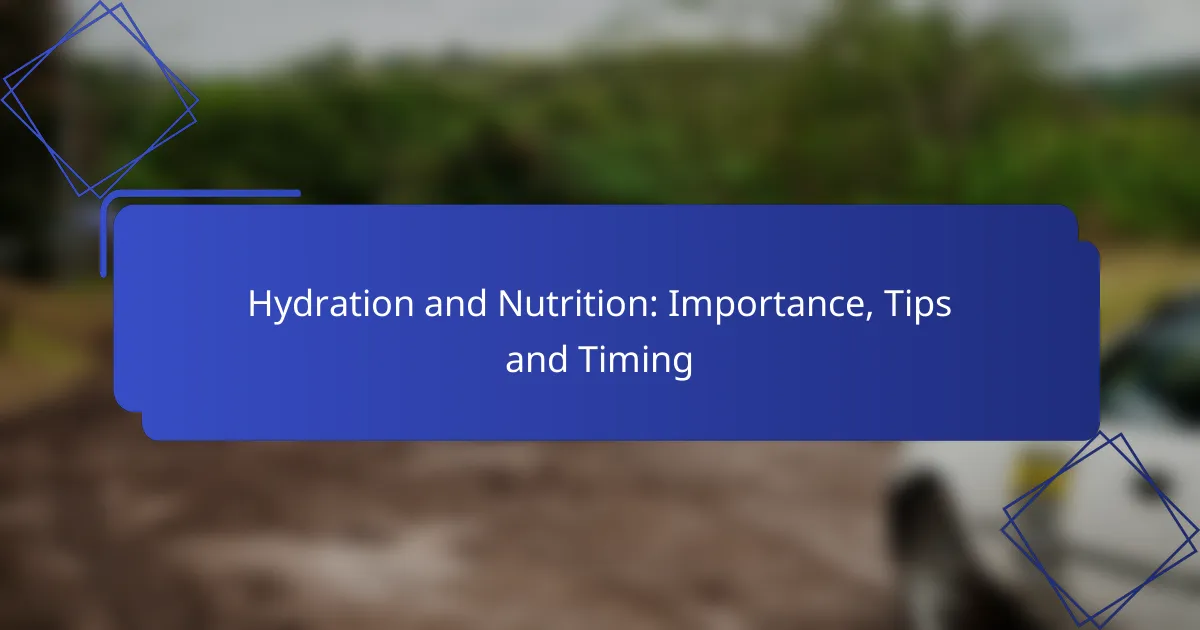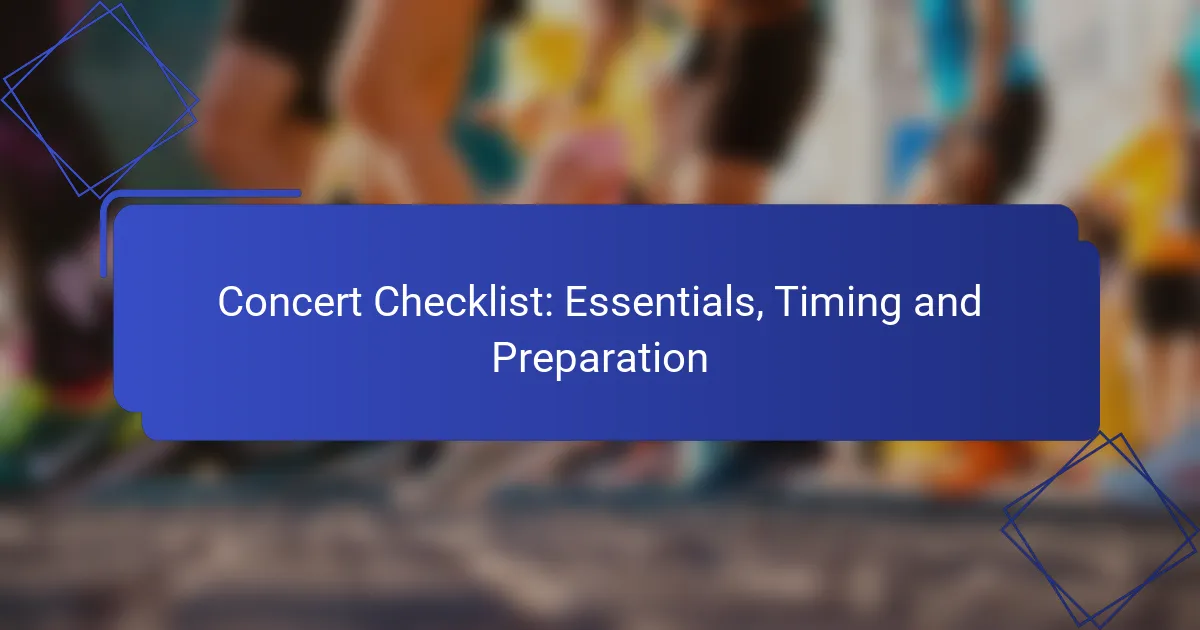Hydration is essential for effective nutrition, as it influences nutrient absorption and overall metabolic function. By maintaining adequate water intake and consuming hydrating foods, individuals can support their health and well-being. Additionally, understanding the timing of hydration and nutrition can significantly enhance performance and recovery.
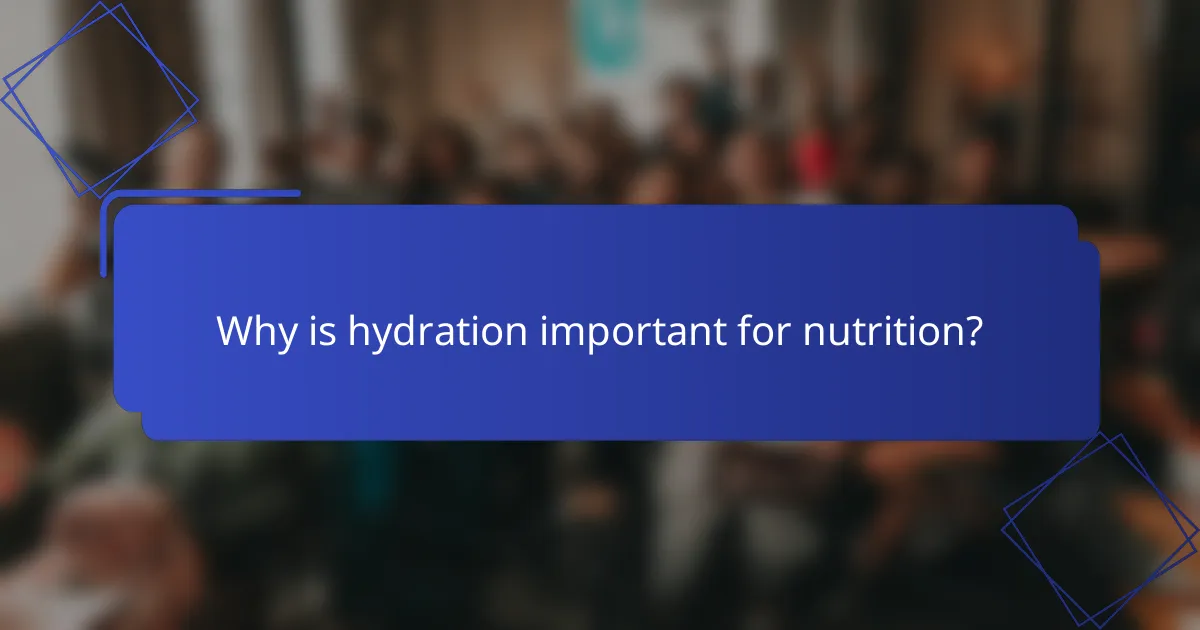
Why is hydration important for nutrition?
Hydration is crucial for nutrition because it directly impacts how nutrients are absorbed and utilized in the body. Adequate water intake supports metabolic processes, ensuring that the body functions optimally and maintains overall health.
Supports bodily functions
Water plays a vital role in various bodily functions, including digestion, circulation, and temperature regulation. It helps dissolve nutrients, making them accessible for absorption in the intestines, and aids in transporting these nutrients to cells throughout the body.
Additionally, hydration is essential for maintaining electrolyte balance, which is necessary for muscle contractions and nerve signaling. Without sufficient water, these processes can become impaired, leading to potential health issues.
Affects energy levels
Proper hydration significantly influences energy levels and overall performance. Even mild dehydration can lead to fatigue, decreased concentration, and reduced physical endurance. For instance, losing just 2% of body weight in water can negatively impact athletic performance and cognitive function.
To maintain optimal energy levels, aim to drink water consistently throughout the day, especially before, during, and after exercise. A good rule of thumb is to consume around 2 to 3 liters of water daily, adjusting based on activity level and climate.
Prevents dehydration
Preventing dehydration is essential for maintaining health and well-being. Signs of dehydration include dry mouth, fatigue, dizziness, and dark-colored urine. To avoid these symptoms, it’s important to drink water regularly, particularly in hot weather or during physical activity.
Consider setting reminders to drink water or carrying a reusable water bottle to encourage consistent intake. Foods with high water content, such as fruits and vegetables, can also contribute to hydration and should be included in your diet.

What are the best hydration tips?
The best hydration tips focus on consistent water intake, incorporating hydrating foods, and monitoring your fluid consumption. These strategies help maintain optimal hydration levels, which are crucial for overall health and well-being.
Drink water regularly
Drinking water regularly is essential for maintaining hydration. Aim for at least 2 to 3 liters daily, adjusting based on activity level, climate, and individual needs. Carry a reusable water bottle to encourage frequent sips throughout the day.
Consider drinking a glass of water before meals and snacks to help regulate appetite and digestion. Setting reminders on your phone or using hydration apps can also help you stay on track.
Include hydrating foods
Incorporating hydrating foods into your diet can significantly contribute to your overall fluid intake. Fruits and vegetables such as cucumbers, watermelon, oranges, and strawberries have high water content and can help keep you hydrated.
Try to include a variety of these foods in your meals and snacks. A salad with leafy greens, tomatoes, and bell peppers can be both refreshing and hydrating, making it an excellent choice for lunch or dinner.
Monitor fluid intake
Monitoring your fluid intake helps ensure you are drinking enough water throughout the day. Keep track of how much you consume by noting it in a journal or using an app designed for this purpose.
Pay attention to your body’s signals, such as thirst and the color of your urine. A light yellow color usually indicates proper hydration, while darker urine may suggest the need for more fluids. Adjust your intake based on physical activity, heat, and personal health conditions.
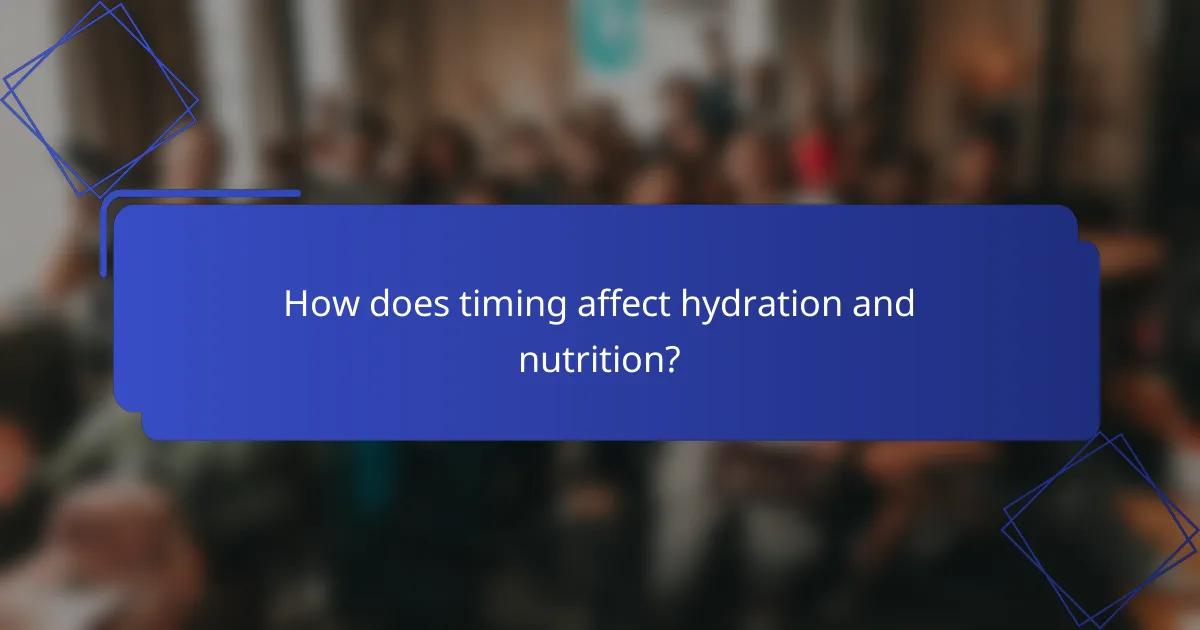
How does timing affect hydration and nutrition?
Timing plays a crucial role in maximizing the benefits of hydration and nutrition. Properly timed intake can enhance performance, aid recovery, and improve overall health.
Pre-workout hydration
Pre-workout hydration is essential for optimal performance. Aim to drink about 500-600 ml of water or an electrolyte-rich beverage 2-3 hours before exercise. This helps ensure that your body is well-hydrated and ready for physical activity.
Additionally, consider consuming a small snack that includes carbohydrates and protein about 30-60 minutes before your workout. This can provide a quick energy source and support muscle function during exercise.
Post-workout recovery
Post-workout recovery involves replenishing fluids and nutrients lost during exercise. Aim to consume 500-700 ml of water or an electrolyte drink within 30 minutes after your workout. This helps restore hydration levels and supports recovery.
In addition to hydration, focus on consuming a balanced meal or snack that includes protein and carbohydrates within two hours post-exercise. This combination aids muscle repair and replenishes glycogen stores.
Meal timing and hydration
Meal timing can significantly impact hydration and nutrition. Eating regular meals and snacks throughout the day helps maintain energy levels and hydration. Aim for three balanced meals and two to three snacks daily, incorporating water intake with each.
Consider drinking water before, during, and after meals. This practice not only aids digestion but also ensures that you remain adequately hydrated throughout the day. Avoid excessive caffeine or alcohol, as these can dehydrate the body.

What are the signs of dehydration?
Signs of dehydration include various physical symptoms that indicate the body is not receiving enough fluids. Recognizing these signs early can help prevent more serious health issues.
Thirst and dry mouth
Thirst is often the first noticeable sign of dehydration. When your body lacks adequate water, it triggers the sensation of thirst to encourage fluid intake. A dry mouth can accompany this, making it uncomfortable and indicating that your body needs hydration.
To combat this, drink water regularly throughout the day, especially during hot weather or after physical activity. Keep a water bottle handy to remind yourself to hydrate.
Fatigue and dizziness
Fatigue and dizziness are common symptoms that can arise from dehydration. When the body is low on fluids, it can lead to decreased blood volume, which may cause feelings of tiredness and lightheadedness. This can impair your ability to concentrate and perform daily tasks.
If you experience these symptoms, take a break to rest and hydrate. Consuming electrolyte-rich beverages can also help restore balance more effectively than water alone.
Dark urine color
Dark urine color is a clear indicator of dehydration. When you are well-hydrated, urine should be light yellow or pale straw. A darker shade suggests that your body is conserving water due to insufficient fluid intake.
To ensure proper hydration, aim for light-colored urine. If your urine is dark, increase your fluid intake and monitor your hydration levels, especially during exercise or hot weather.
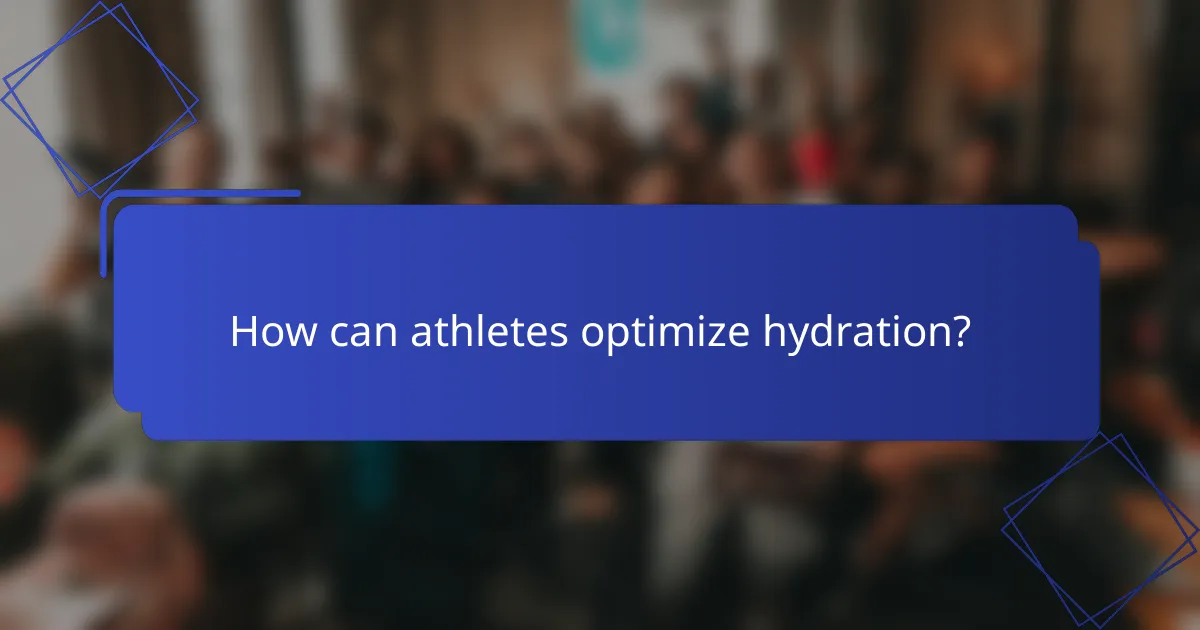
How can athletes optimize hydration?
Athletes can optimize hydration by understanding their fluid needs, using electrolyte solutions, and timing their intake effectively. Proper hydration enhances performance, aids recovery, and prevents dehydration-related issues.
Use electrolyte drinks
Electrolyte drinks are essential for athletes, especially during prolonged or intense physical activity. These beverages help replenish lost minerals like sodium, potassium, and magnesium, which are crucial for muscle function and hydration balance.
When selecting an electrolyte drink, look for options with a balanced ratio of electrolytes and carbohydrates. A drink containing 6-8% carbohydrates is often ideal for maintaining energy levels without causing gastrointestinal discomfort.
Plan hydration schedules
Establishing a hydration schedule is vital for athletes to ensure consistent fluid intake throughout training and competition. Aim to drink water or electrolyte solutions before, during, and after exercise to maintain optimal hydration levels.
A practical approach is to consume about 500-700 ml of fluid 2-3 hours before exercise, followed by 200-300 ml every 10-20 minutes during activity. Adjust these amounts based on individual sweat rates and exercise intensity.
Adjust for climate conditions
Climate conditions significantly impact hydration needs. In hot and humid environments, athletes may require more fluids due to increased sweat loss, while cooler conditions may reduce fluid intake needs.
Monitor your hydration status by checking urine color; pale yellow indicates proper hydration, while darker shades suggest a need for more fluids. In extreme heat, consider increasing fluid intake by 20-30% to compensate for higher sweat rates.
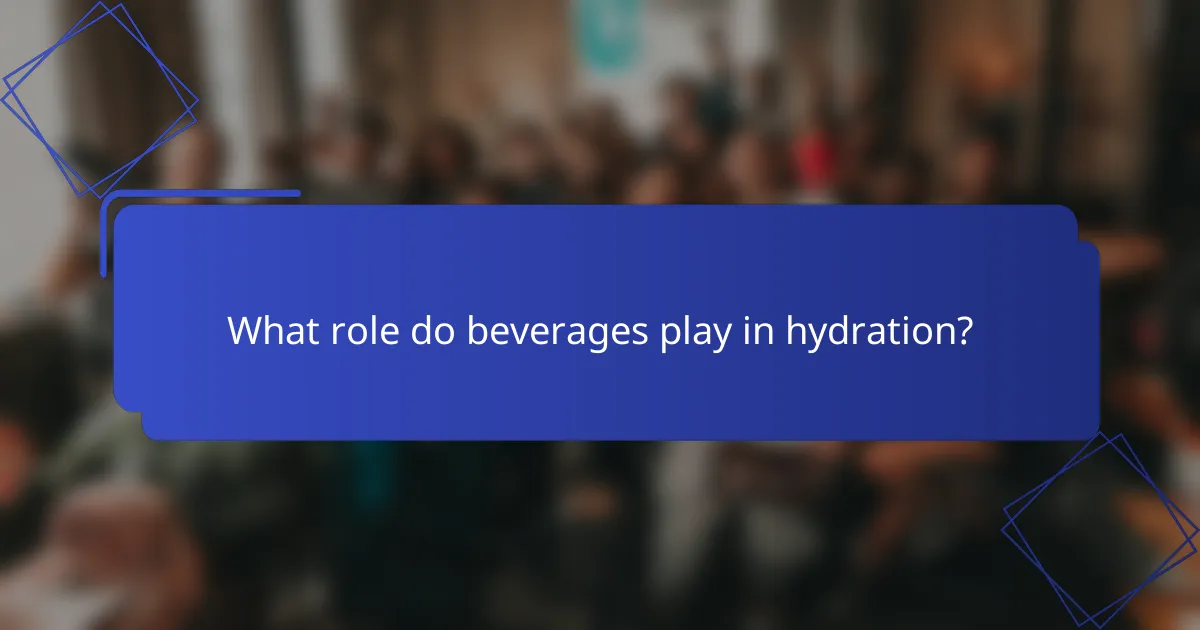
What role do beverages play in hydration?
Beverages are essential for maintaining hydration, as they provide the fluids necessary for bodily functions. Proper hydration supports digestion, temperature regulation, and overall health, making the choice of beverage significant for optimal hydration.
Water vs. sports drinks
Water is typically the best choice for hydration, especially for everyday activities and light exercise. It is calorie-free and effectively replenishes lost fluids without added sugars or electrolytes.
Sports drinks, on the other hand, are designed for prolonged physical activity or intense workouts. They contain electrolytes and carbohydrates, which can help replenish lost nutrients and provide energy. However, they also contain sugars, so they should be consumed judiciously, mainly during extended exercise sessions lasting over an hour.
Caffeinated beverages
Caffeinated beverages, such as coffee and tea, can contribute to hydration but should be consumed in moderation. While caffeine has a mild diuretic effect, the hydration benefits from these drinks often outweigh the potential fluid loss.
For those sensitive to caffeine, it’s advisable to limit intake, especially before exercise. Opting for decaffeinated versions or balancing caffeinated drinks with water can help maintain hydration levels effectively.
